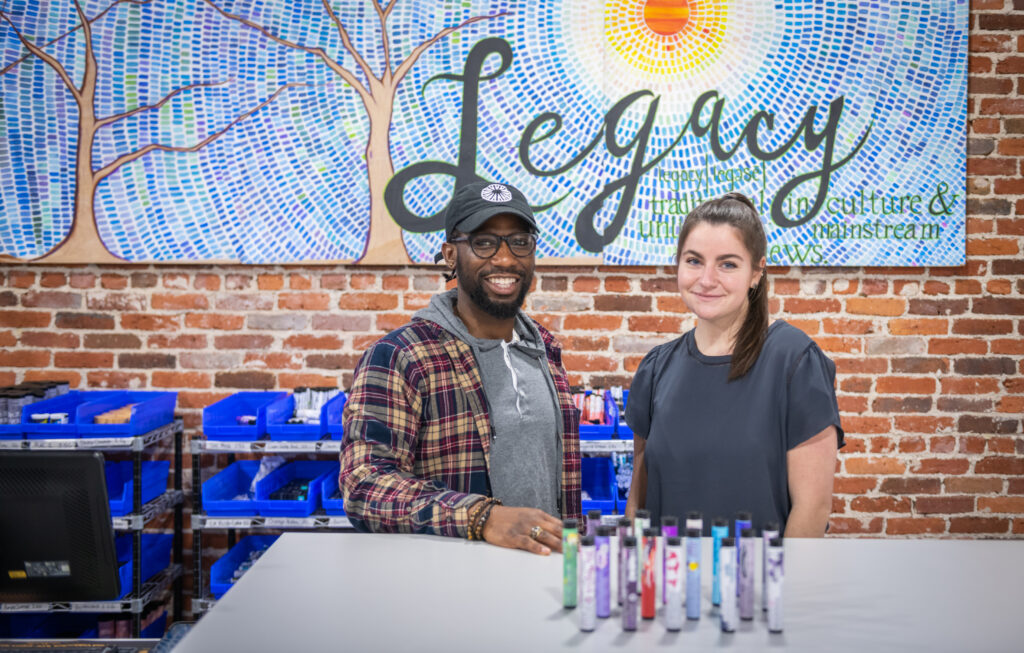Clark MBA and professor find opportunity in burgeoning cannabis industry

Jillian Skulsky ’21 has been taking Clark University MBA courses remotely from inside the Major Bloom cannabis establishment in Worcester. As the company’s director of business development, Skulsky can put skills learned in class to use as soon as she closes her laptop.
“It’s funny because I was taking supply chain management in the inventory room and I already do that for my job,” she says.
Skulsky, who majored in economics and minored in entrepreneurship and innovation, had to quickly change her plans in 2020 when the onset of the COVID-19 pandemic meant the New York City internship she had planned for that summer was canceled. Teresa Quinn, manager of the Entrepreneurship and Innovation program, suggested that Skulsky connect with Ulysses Youngblood, an adjunct professor of cannabis regulation and entrepreneurship and innovation at Clark, also the co-founder and president of Major Bloom.
The day after her 21st birthday, she started working at Major Bloom. The cannabis business on Millbury Street was still moving through the Massachusetts Cannabis Control Commission regulatory process and was not yet open to the public.
“When I first started there was dirt on the ground and it was just me and Ulysses,” Skulsky says. In about two years, she’s seen the empty commercial space transform into a bustling dispensary.
“We had no lights, no internet, no seats. But Jill had this energy of ‘we’re going to get this done,’” Youngblood says.
Skulsky found herself drawn to the possibilities available in a newly legal industry.
“Being an economics student, you study industry trends and market trends a lot. The cannabis industry lacks history other than the legacy market and you can’t find data on the legacy market because it’s not tracked,” she says. The legacy market is how cannabis was grown and sold before legalization.
Youngblood says Clark students who want to get into the cannabis industry have an advantage. Clark offers the online Certificate in Regulatory Affairs for Cannabis Control, which was the first certificate of its kind in the nation. The program aims to set the standard on cannabis control education as the industry generates new economic benefits and public policy discussions.
In fall 2020, Skulsky was a teaching assistant in Youngblood’s Regulatory Frameworks for Cannabis Control course.
The certificate program was born when Clark began hearing from local town and city leaders who needed guidance in creating strategies around the newly legal cannabis industry. Since then, the certificate program has evolved as regulatory frameworks grow and develop, says John LaBrie, dean of the School of Professional Studies.
LaBrie sees Major Bloom as an example of the kind of business many had in mind when cannabis was legalized in Massachusetts.
“There was a lot of hope that the industry would be diverse and responsive to communities that have been marginalized and mistreated by marijuana policy,” LaBrie says. “Especially here in Massachusetts, there was a lot of hope for the industry to be an economic driver for those communities. I don’t know if that’s becoming a reality, but I see pockets of it with stores like Major Bloom.”
Read more: Kimberly Roy, M.S. ’19, is a key policy voice as state cannabis commissioner
Over the last two years, Skulsky has found herself at Major Bloom just about every day, preparing inventory, packaging orders, and handling wholesale operations. Each Monday evening, she leaves Major Bloom and makes the short drive to Clark for class. Her remaining courses are primarily online, which helps her balance education and a full-time job.
Youngblood says he hired Skulsky because he could tell she was ambitious, something that became even more apparent as Major Bloom got closer to opening to the public.
“I realized her genius as soon as we got our license and we started getting inventory,” he says. “She really turned on her personality in building out our systems.”
Major Bloom, which is an equity business, has received a final license to operate as a marijuana courier, which means it can soon offer home delivery of products.
“Being able to be a part of it and learn as it happens is really cool,” says Skulsky.


